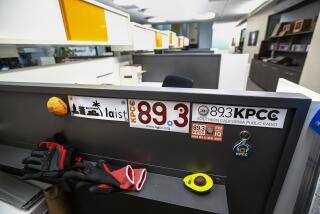KPCC, Minnesota Public Radio Back at Negotiating Table : RadioPasadena station would get new management and an infusion of cash for equipment and news staff.
- Share via
After several months of turmoil and uncertainty over the future of KPCC-FM (89.3), the seven-member board of directors of Pasadena City College has agreed unanimously to restart negotiations with longtime suitor Minnesota Public Radio about taking over operation of the campus-based station.
The logjam broke after Minnesota--operator of 30 public radio stations and the largest producer of programming for national audiences outside National Public Radio--submitted a proposal that met the board’s key condition that the public station’s license would remain in the college’s hands.
Instead, Minnesota now proposes a 15-year lease to operate KPCC and would provide budget guarantees of $12.8 million to a newly created entity, Southern California Public Radio, to run the station over the first five years.
Pledging to maintain the “Intelligent Talk” format crafted by KPCC Program Director Larry Mantle, William Haddeland, a spokesman for Minnesota Public Radio, said, “We hope to create the most important flagship news and information public radio station in the state of California, [with] a larger news department to cover Sacramento, to cover local and community news. Much like we do here.”
Under the proposal, there will be a 10-person news department to cover local and state affairs.
James Kossler, president of KPCC, said he is “very optimistic” that the deal will be consummated, though he hinted that the college might want a shorter time frame for the lease. “How long it goes--five years, 10 years, 15 years--we’re not sure yet.” But he quickly added that he did not want to “negotiate in the public arena.”
Mantle was very pleased by the board’s decision to pursue negotiations. “I see this as a win-win-win,” said Mantle, who also is host of the weekday afternoon show “AirTalk.” “. . . It’s going to be a wonderful benefit for KPCC listeners and for students at Pasadena. It provides for an infusion of financial support, expertise and updated equipment.”
In May, Mantle had hinted on the air that he and fellow staffers would quit unless changes were made at the financially embattled station. Although a 1998 budget deficit of $170,000 has been eliminated, he said he was frustrated by not being able to “freely program” the station and by having to adhere to programming dictates set by a publicly elected college board with local concerns. With a $1.1-million annual budget, KPCC, which is heard throughout the Southland, has more than 300,000 listeners a week.
“We think that over 15 years, we will build up tremendous audience support,” Haddeland said. “We’re very interested in involving the creative community of the Los Angeles area into national programming, and it goes to our objective of contributing to public radio nationwide. That’s why we started ‘Prairie Home Companion.’ And we think we are going to break even, [that] there are resources within the Southern Cali
fornia market to raise [$12.8 million] and improve the service.”
In making the decision this week to resume its talks with Minnesota Public Radio, the Pasadena City College board effectively eliminated two other proposals to take over operation of KPCC--from Radio Bilingue, based in Fresno; and KPBS-FM in San Diego.
Under Minnesota Public Radio’s previous proposal, which the college had rejected, the Southern California Public Radio would have taken possession of KPCC’s license. Its board would have been selected by the college and Minnesota--but with Minnesota choosing one more person than the college, thereby providing it with the potential of always having the deciding vote.
Now Minnesota proposes establishing a 13-member board for the new organization, with “a minimum of 10 members who are residents of Southern California.”
Bill Kling, president of Minnesota Communications Group, the nonprofit parent organization, emphasized that the leadership for the development of KPCC and the chairman of the board will come from Southern California.
More to Read
Sign up for Essential California
The most important California stories and recommendations in your inbox every morning.
You may occasionally receive promotional content from the Los Angeles Times.










